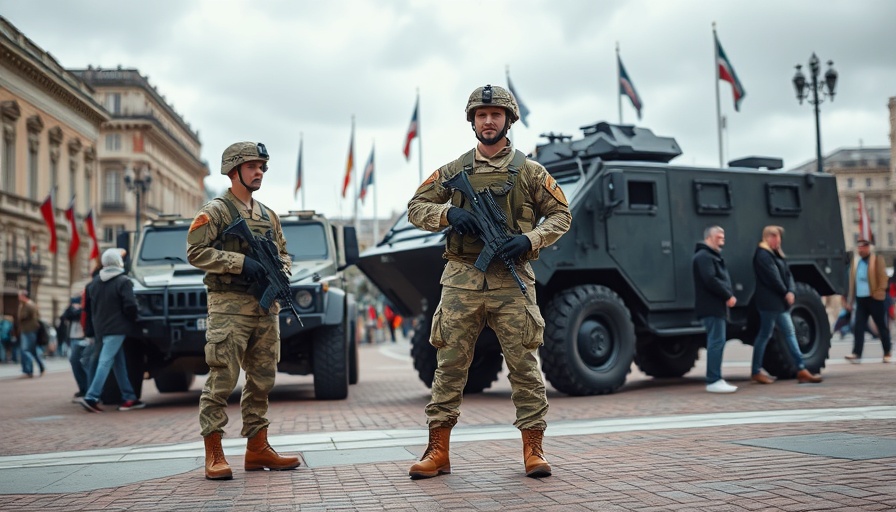
Ohio's National Guard Deployment: A Contested Decision
In light of recent discussions surrounding Ohio Governor Mike DeWine's decision to deploy National Guard troops to Washington, D.C., a significant portion of retired military personnel has voiced their opposition. Many argue that this move does not constitute a national emergency. The deployment, which aims to bolster security measures in the nation’s capital, has sparked a fierce debate regarding the necessity and implications of utilizing state military resources for such purposes.
Examining the Rationale Behind Opposition
Those against the deployment have pointed out the lack of credible threats that warrant military intervention. Retired Major General John Smith articulated that the situation in D.C. does not reflect the criteria typically associated with national emergencies, emphasizing, “Our troops should be employed when there is a legitimate threat to our security — not for political show.” This perspective resonates with many veterans who feel that the Guard should focus on local issues, such as responding to emergencies caused by natural disasters or community support initiatives.
The Guard's Role: A Discussion of Expectations
The Ohio National Guard, a branch designed to support state efforts, plays a crucial role in domestic stability. Its members often participate in disaster response efforts, including recent deployments during the COVID-19 pandemic, which showcased their essential contribution to community health efforts. Critics of DeWine's decision argue that deploying these resources to D.C. detracts from local needs, potentially leading to a gap in services where they are critically needed.
Historical Context: The Guard's Previous Deployments
Historically, National Guard units have been deployed for various reasons, often during times of genuine crises or unrest. For example, in the aftermath of the September 11 attacks, there was widespread military presence in response to a clear national threat. In contrast, the current circumstances seem different; many veterans feel that meeting bureaucratic needs does not constitute a comparable emergency.
The Emotional Response: Voices from the Veteran Community
While the decision is rooted in a political agenda, it carries significant emotional weight among those who have served. Retired sergeant Lisa Jones shared her apprehensions, stating, “The troop’s role is to protect and serve the community. I want them to be here when we need them, not sent across the country for political optics.” This sentiment resonates with many who served under the belief that their primary duty was to their home state and communities.
Current Events: Understanding the Broader Impact
This topic could not have surfaced at a more critical juncture, given increasing polarization in national politics and security. As DeWine's administration evaluates the necessity of the deployment, Ohioans must consider the implications of military action in a politically charged environment. It urges citizens to reflect on the role of the military, not just as enforcers but as community members committed to enhancing public safety.
Future Predictions: Where to From Here?
As state leaders assess the ideal use of National Guard resources, the dialogue is likely to evolve. If the deployment proceeds, it may set a precedent for future actions, shifting how we view state-based military roles. In an atmosphere striving for unity and security, veterans advocate for a reassessment of priorities that focuses on local needs and true emergency response.
Common Misconceptions: Clarifying the National Guard's Purpose
A misunderstanding persists regarding the National Guard's scope of duties versus those of federal troops. The Guard serves at the behest of state governors to respond to domestic crises. Ensuring clarity on this role and promoting its functional boundaries provides a vital conversation point among communities aiming to understand military involvement.
The resistance to DeWine's deployment reflects a broader sentiment within Ohio: that the state’s military resources should remain committed to local challenges. It’s essential for our towns and cities to have accessible support when unforeseen crises emerge, and public sentiment signals the need for substantive discussion and engagement around the allocation of our military personnel.
Ultimately, as citizens of Ohio, it is our responsibility to stay informed and active in these discussions. The future of our National Guard and state security depends on it. By voicing your thoughts and concerns, you are participating in a critical dialogue that will shape the direction we head as a state.
Keep abreast of local news and events to ensure a well-balanced perspective on such significant issues.
 Add Row
Add Row  Add
Add 




Write A Comment